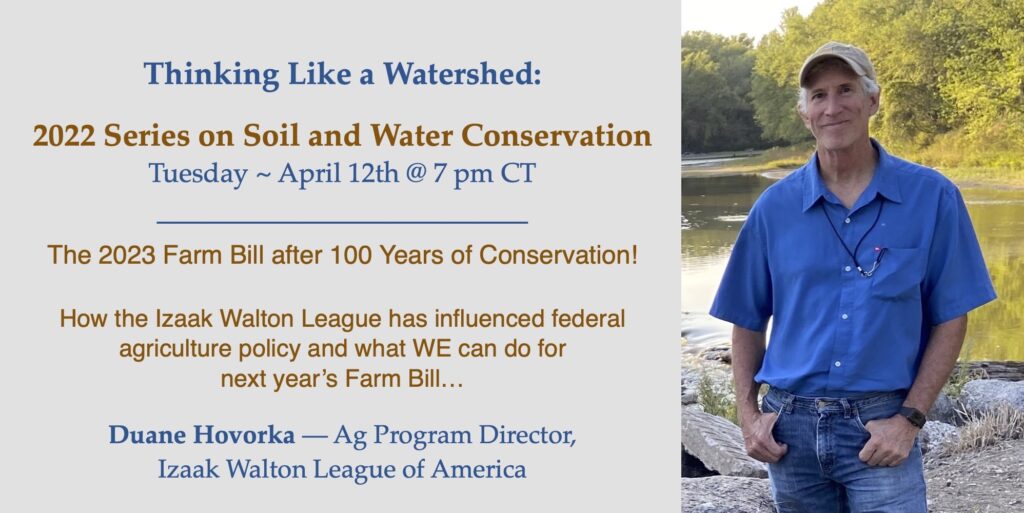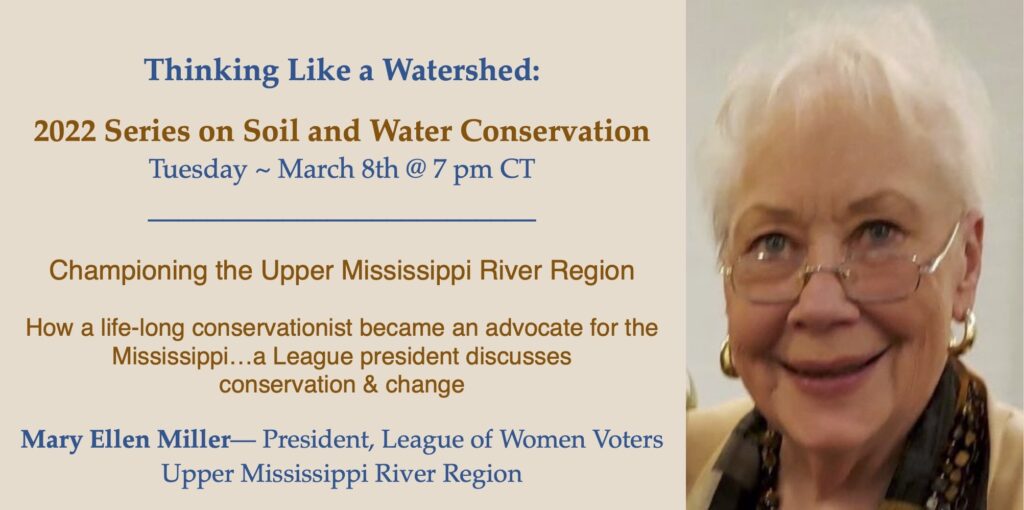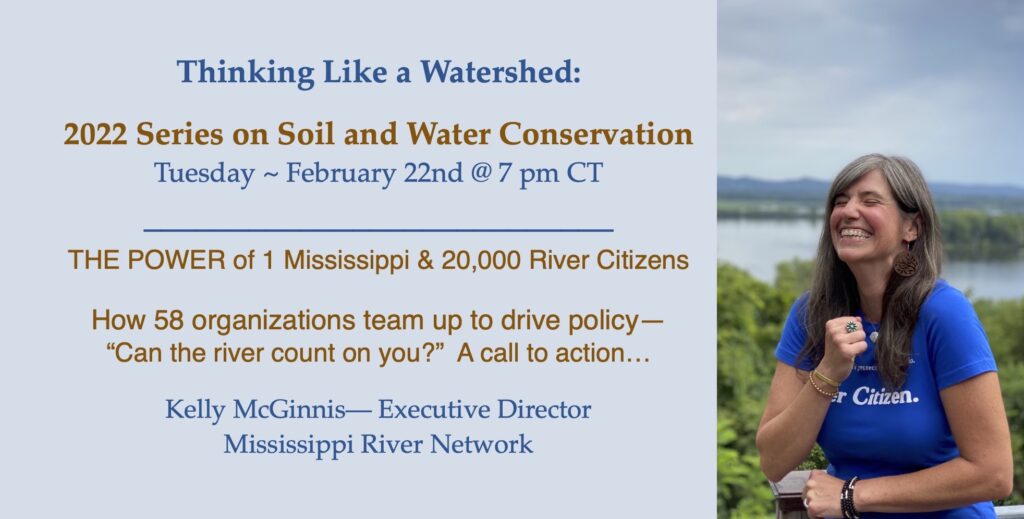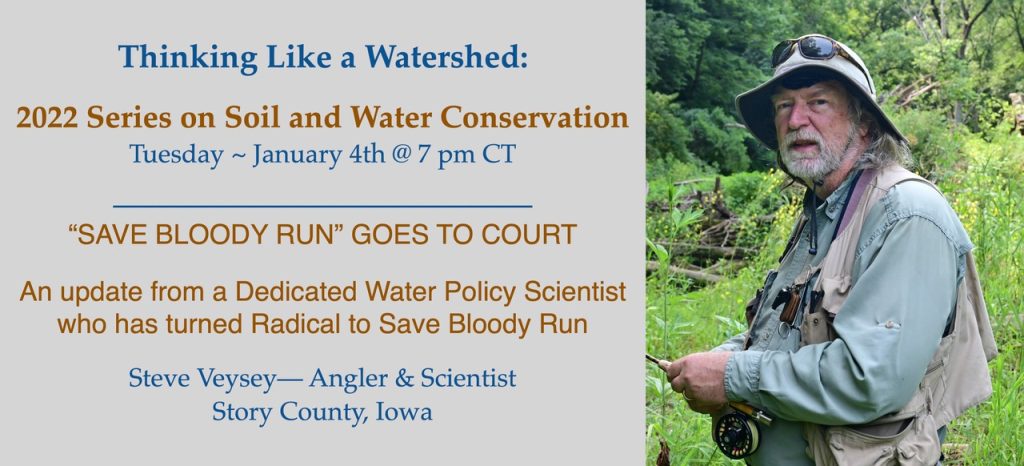But first!
Top of page for deadlines, with details below. Each event requires a simple registration – read on for what and how to act on your priorities:
➢ Ap. 12 at 7 p.m. Central, our Upper Mississippi River Initiative (UMRI) monthly virtual series, “Thinking Like a Watershed” with Izaak Walton League Agriculture Director Duane Hovorka
➢ Ap. 24 at 1 p.m. Gilmore Creek clean up, SOS demos (and donuts)
➢ “We Are Water” exhibit in Winona, MN continues through Ap. 25
➢ “Does it take an act of Congress to protect the Mississippi?” May 21 at 10:30 a.m.
Did we mention Bloedows Donuts?
What pairs better with a spring stream side litter cleanup than a locally made Bloedow’s donut afterwards? And some squirming macro invertebrates from the very stream you’ve just helped to keep clean. And a chance to do some of the stream sampling methods our Save Our Streams volunteers (SOS) conduct two to four times a year. Please join us on Sunday, Ap. 24, at 1 p.m. on a section of Gilmore Creek near Winona High School. A registration helps but is not required. Here’s a poster with details, including how to register and where to park.

Our Driftless SOS teams honor Earth Day weekend by joining partners on Sunday, Ap. 24 to clean up litter along a stretch of Gilmore Creek in Winona. In addition, we’ll be doing hands-on how-tos for nitrogen testing, reading a secchi tube, and identifying live macro invertebrates. And oh, yes, we’ll have Bloedow’s Donuts for intrepid litter picker-uppers! The event is organized as part of the “We Are Water” exhibit at the Winona County Historical Center.
PLUS: A related event organized by Trout Unlimited in the Winona area unfolds on Ap. 30 at 1:30 p.m. Here is what we know: Trout Unlimited Habitat Improvement Demonstration (including an electrofishing demo). Meet at the parking area downstream (north) from Farmer’s Park between Hwy 14 and the Park. Also join in a wildflower tour following the demonstration! Register required in advance by calling 507.454.2723 ext. 0 or stopping in the History Center. Limited to 40 people.
“We Are Water” exhibit melds stories and science
The Winona County History Center opens the state’s first of six 2022 sites to host the traveling exhibit, “We Are Water,” in early March and it remains open to all through Monday, Ap. 25. This is an active and family-friendly story of water, people, and the environment that includes Winona area voices and tremendous learning opportunities. There are boards to read, stories to write, and stories to hear via headphones in several languages of our region. There is an interactive screen game to put you in the farmer’s seat since agriculture is a major source of water pollution. There is a puppet theater, children’s books on the topic, maps, excellent diagrams, a clever illustration of karst topography, and both staff and volunteers who can serve as your guide. By the way, there may be weekend shifts yet available if being a docent appeals to you. Driftless stream team members with Save Our Streams (SOS) have been participating and it is fun! Here’s where to pick a shift: We Are Water MN @Winona: Docent Sign-Up.
“We Are Water” is part water education, part community and partnership building via a multi-agency effort to embrace complementary efforts by groups like our Driftless SOS teams. We are happy to be part of local activities and to help people feel inspired to learn and do something good for our shared water. By the way, our Driftless stream teams take to eight sites for spring sampling in April/May – please contact Caroline van Schaik if you would like to get your hands wet with us.

A reminder that our Driftless SOS stream teams will be spring sampling at eight sites in Winona, Houston, Olmsted, and Filmore Counties. You only need enthusiasm to join in!
“The 2023 Farm Bill after 100 Years of Conservation!”
Register in advance for another extraordinary presentation— Our monthly “Thinking Like a Watershed” program continues Tuesday, Ap. 12, 2022 at 7 p.m. Central with a conversation with the agriculture policy director of the Izaak Walton League (IWLA), Duane Hovorka. How the Izaak Walton League has influenced federal agriculture policy and what WE can do for next year’s Farm Bill

After registering, you will receive a confirmation email with the link to join the program on Tuesday, Ap. 12, 2022 starting at 7 p.m. Central.
The League played an instrumental role in groundbreaking environmental victories during the past 100 years. Duane will highlight some of those accomplishments such as the creation of the Soil Bank in 1956, the Clean Water Act in 1972, the Conservation Reserve Program in 1985, and the Conservation Stewardship Program in 2002.
Duane also will summarize the 2023 Farm Bill suggestions he’s heard during winter listening sessions. It’s not too late to add your own ideas as the Izaak Walton League begins to shape its priorities for next year’s legislative Farm Bill showdown. Bring your suggestions and questions to this Zoom table as Duane pulls together some of the best ideas to help the IWLA prioritize solutions and craft its agenda for the 2023 Farm Bill.
This monthly series is a project of the Upper Mississippi River Initiative (UMRI) of the Izaak Walton League of America, with co-hosts Chris Henning of the Panora Conservation Chapter and Des Moines Chapter Communication Director, Bud Hartley. We feature guests for 30-40 minute presentations that shed daylight on good works done in the name of the Mississippi and its uplands. In this way we uplift our shared goals for a cleaner river, a cared for environment, and kinder communities. Recorded programs are available shortly after they air live.
An inter-League of Women Voters presents legislative options
The League of Women Voters-Upper Mississippi River Region interleague organization (LWV UMRR) hosts its annual meeting May 21, 2022 at 10:30 a.m. with a discussion of innovative answers to that million dollar question, “Does it take an act of Congress to protect the Mississippi?” From a recent blog promoting the event, league communications director Gretchen Sabel writes, “We will cover the Mississippi River Restoration and Resilience initiative (MRRRI), the Saving the Mississippi River Together initiative (SMRT), the Farm Bill reauthorization and a big idea – the notion of an Upper Midwest Compact to protect the waters of the Mississippi from diversion. Our speakers represent organizations that are working to protect the Mississippi.” Details on speakers and to register are found here!
Livestock for soil health
Why do we see all that bare farm ground out there? Managed grazing with its permanent cover year round is such a compliment to soil health, which has grown to be embraced by a wide array of farmers, and yet, here we are: spring winds about to blow over an expanse of root-devoid soil, rain turning rivers brown from erosion and contaminated with farm chemicals, soil health depleted in every way. However – what also has grown is the understanding that there are options beyond grazing that both solve and soothe conditions further exacerbated by extreme weather. Some of the barriers and some sound alternatives came forth during a meeting with farmers and resource agents hosted as part of a federal grant entitled, “Match Made in Heaven.” It is a three-year effort by the Midwest Perennial Forage Working Group of Green Lands Blue Waters. There is more online or please contact Caroline van Schaik, UMRI staff and a member of the working group and grant advisory committee.
Here are a few insights from the latest, and quite forthcoming, meeting:
* While livestock producers automatically think about crops for feed, crop farmers need not unless they are interested in improving soil health, as many are;
* There is a shortage of livestock advisors even as bringing livestock onto crop farms presents logistical nightmares worthy of help for all parties;
* Livestock compaction on crop fields and left-behind manure nutrients when those livestock come home raise grave concerns;
* Raising hay or small grains for feed can be part of the solution without a crop producer expanding to livestock;
* “Livestock” can mean sheep or over-wintering dairy heifers, for examples, not just beef cows.
Ditch victories
The Minnesota River Valley is rife with ditches and therefor, so-called ditch improvement projects that traditional fly under the radar of agency scrutiny. But UMRI staff and volunteers in partnership with the MN Department of Natural Resources, the Minnesota Center for Environmental Advocacy, and others recently report positive movement given the overarching goal of cleaner public water. Limbo Creek near the town of Sacred Heart must now undergo an Environmental Assessment Worksheet for a project of concern on what is otherwise known as Renville County Ditch #77. And on Lyon County Ditch #14, a project has been withdrawn, with the landowner opting instead to clean out tile lines and maintain the ditch as is. A third case in Blue Earth County has been postponed. These efforts stem from tedious work by UMRI to uncover and document ditch projects because they are a major source of sediment and fertilizer contamination for the Mississippi River. They negatively impact the region’s hydrology and habitat. The elusive and obstructive nature of county ditch projects under the current system combined with documented damage of little to no oversite has led to the introduction of legislation requiring a state-wide registry with project sign-off requirements. This is ditch Victory with a capital “V” for public water all the way to the Gulf of Mexico.
Links to recent “Thinking” presentations

— “Championing the Upper Mississippi River Region” Thinking Like a Watershed ~ Mary Ellen Miller— March 8th, 2022
How a life-long conservationist became an advocate for the Mississippi…a League president discusses conservation & change with Mary Ellen Miller, President, League of Women Voters Upper Mississippi River Region

—“The POWER of 1 Mississippi & 20,000 River Citizens” Thinking Like a Watershed ~ Kelly McGinnis— February 22nd, 2022 How 58 organizations team up to drive policy—“Can the river count on you?” A call to action…

Photo by: David Thoreson
— “Save Bloody Run Goes to Court” Thinking Like a Watershed ~ Steve Veysey— January 4th, 2022 An update from a Dedicated Water Policy Scientist who has turned Radical to Save Bloody Run.
—“Heartland Heroines” Thinking Like a Watershed ~ Robin Moore & Denise O’Brien— June 1, 2021 How two savvy conservationists empower working farm landowners to put their inner land ethic to work.
—“Planting Seeds to Grow Vibrant Communities” Thinking Like a Watershed ~ Chris Deal & Art Cullen— May 4, 2021 How Jefferson, Iowa’s Chris Deal is working with California Rep. Ro Khanna and others to grow vibrant rural communities in the Heartland with perspectives from Pulitzer Prize—winning journalist and editor of The Storm Lake Times, Art Cullen.
—“Watershed Bridges— Green to Blue” Thinking Like a Watershed ~ Vicki Nichols Goldstein & Seth Watkins— April 6, 2021 How improving soil health and water quality in Iowa and other inland states benefit watersheds that provide critical services from land to sea.
—“Local Heroes in Howard County” Thinking Like a Watershed ~ Neil Shaffer & Hunter Slifka— March 2, 2021 How they have incorporated several thousand acres of land under conservation programs–the largest percentage in Iowa.
—“The Accidental Conservationist” Thinking Like a Watershed ~ Wayne Fredericks— February 2, 2021 How an Iowa Farmer is Improving Natural Capital while Increasing Profits with Conservationist and Farmer, Wayne Fredericks from Mitchell County, Iowa.
